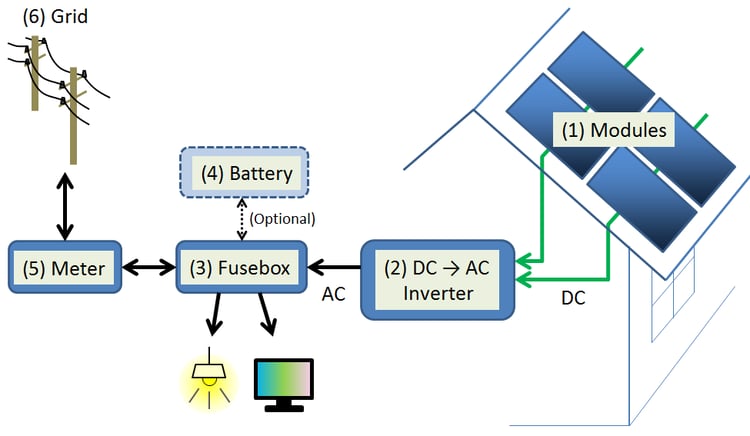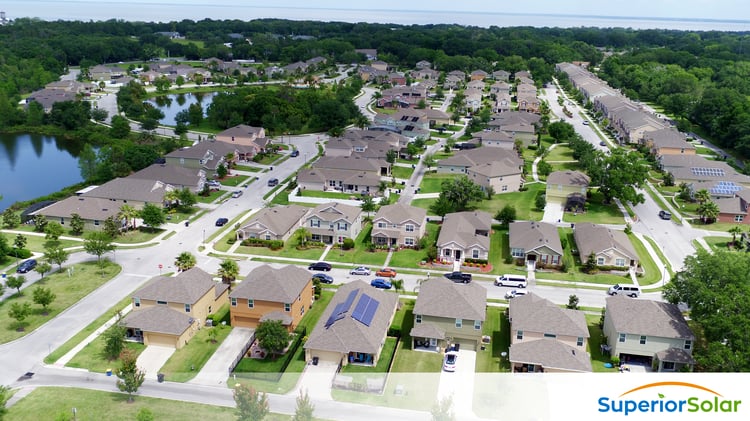Solar is doing well in the United States. PV panel prices are now so affordable that residential installations have had huge developments. Within the last year, alone, there was a 66% increase in solar installations. And just last month, it was reported that over a million PV systems have been installed across the country!
To make solar even better, research has recently come out concluding that the cost of residential solar is comparable to the average price of power on the grid. This means that when you invest in solar, you get to lock in those low energy rates now and you won’t have to deal with increased energy rates when utility companies decide to raise them again, later.
That’s why, in addition to the many incredible environmental benefits, solar is such a superior option. A typical PV system will more than pay off the initial investment and will continue to give you extra dollars through net metering.
What Do You Mean I Get Extra Dollars?
When your solar system begins to produce more energy than you’re using (think in the cooler months when you don’t have your air conditioning running all the time), net metering occurs: a solar system will feed extra power back to the grid and the utility company in charge of that grid will actually give credits to the system’s owner for the extra energy. This is called net metering.

It’s great, right? Getting money without working for it?! And utility companies are required to allow for net metering. It’s mandatory in Florida and 40 other states.
However, not all utility companies are as excited about this as you might be. Some would rather keep their monopoly on energy production. Several utility companies have even set up a series of backlashes, through congressional means or fees to the homeowner just to install a net meter. Often, these utility companies contend that the net metering fees they have to pay are transferred to non-solar homeowners. They try to persuade state regulators to cut back on net metering provisions, arguing that it’s not fair to those without solar.
So… Does Net Metering Really Cause a Cost Shift?
Research increasingly concludes that it doesn’t. If anything, the economic benefits of net metering are beginning to outweigh the costs and cause no significant price increase to non-solar consumers. Net metering is, in most cases, a net benefit--for both the utility and the non-solar rate-payers!
In 2013, Vermont’s Public Service Department conducted a study that proving that “net metered systems do not impose a significant net cost to ratepayers who are not net-metering participants.” In 2014, the Mississippi Public Services Commission concluded that “the benefits of implementing net metering for solar PV in Mississippi outweigh the costs.” In 2015, the Maine Public Utility Commission commissioned a study whereby they put a value on a kWh of energy and concluded that “solar power provides a substantial public benefit because it reduces electricity prices due to the displacement of more expensive power sources, reduces air and climate pollution, reduces costs for the electric grid system, reduces the need to build more power plants to meet peak demand, stabilizes prices, and promotes energy security. These avoided costs represent a net benefit for non-solar ratepayers.”

Of course, there are instances where there are issues with net metering cost-recovery. State regulators have not systematized the net metering provisions process and different markets favor different rate designs. But for the most part, net metering is a net benefit.
The value of solar can’t help but be addressed moving forward. Distributed solar is here to stay. Utility companies have a chance to address their existing business models by opening themselves up to owning and operating PV assets, but backlash or no, state policies will increasingly be updating their net metering policies, with or without utility support.
Contact us or call at 407.331.9077 to get in on net metering today. Get locked into strong savings before utilities add more hurdles to get in.
